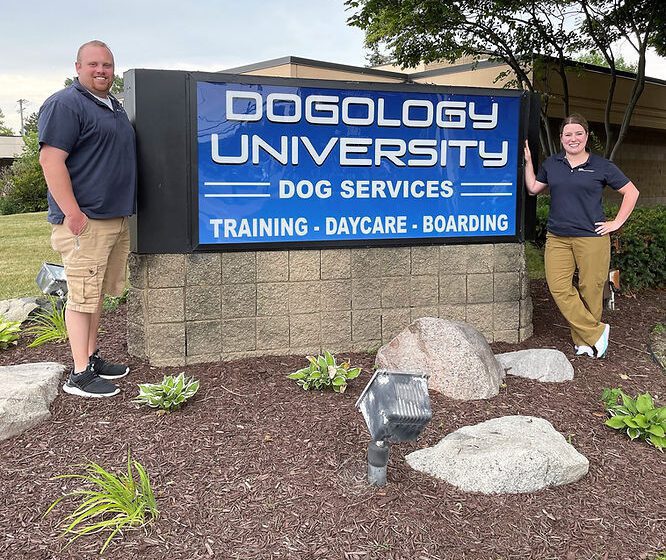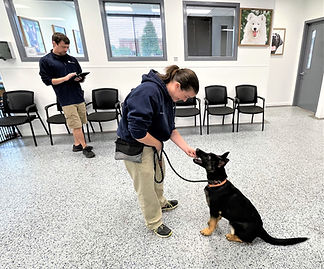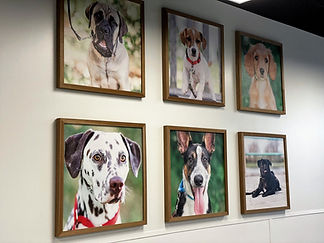Raise the ‘Woof!’: New local dog obedience business a success

Matthew and Ashaleena Lamarand opened Dogology University in the fall of 2021.
Married U.S. veterans launch steadily-growing dog-focused business
Like most institutions of higher learning, Dogology University has students, parents, varying degrees of temporary separation anxiety and emotional graduation ceremonies.
What makes the nine-month-old Canton business unique is its graduates walk on four legs, not two.
Opened in the fall of 2021 by married United States military veterans Matthew and Ashaleena Lamarand, Dogology University employs a rare – if not one-of-a-kind – method of turning even the most-out-of-control canines into lovable pets.
Instead of the age-old protocol of dog owners bringing their tail-wagging loved ones to one-hour-per-week obedience classes, the Lamarands have developed a proven system that features dogs staying a week at a time at their spacious Ford Road headquarters (thus the range of separation anxiety, both for owners and dogs), where a team of highly-skilled trainers work their magic in a facility that includes a gymnasium and cafeteria.
While the business has steadily grown, it hasn’t always been a walk in the park (so to speak), its founders confirmed.
“In 2019, we both quit our jobs (Matthew worked security for Cranbrook Schools and Ashaleena was a medical assistant for the Henry Ford Health System) and trained dogs at our home in Canton,” said Matthew Lamarand, a 2007 graduate of Plymouth High School and a former dog handler for the U.S. Secret Service (Ashaleena is a native of Arkansas).
“We told ourselves we had three months to make this work before we’d have to start looking for new jobs. We registered our first clients in September of 2019 and the business started doing really well.”

“Then Covid hit and we started getting a little scared,” Ashaleena added. “We had people who had paid for our services, but they started pulling out because of the unknown that went along with the pandemic.”
With their business at a standstill, the Lamarands did what came naturally to them: They gave back to the community they had become entrenched in.
“We had time on our hands, so we started going to shelters and training dogs for free to help rehome them and train them to become service dogs for veterans with PTSD (post traumatic stress disorder),” Matthew said. “There was one veteran we trained a rescue dog for and he was very, very suicidal; he wasn’t doing well. He absolutely loves the dog and is doing well now.”
“It’s success stories like this that convinced us that what we’re doing is making a difference,” Ashaleena said. “Once the pandemic eased, we made it a mission to make this our full-time job. There was no turning back.”
Moving into the Ford Road facility was surreal for the Lamarands, whose roster of clients grew steadily.
“If you would have told me when I was 18 years old that I would own a business on Ford Road in Canton, I would have said you were out of your mind,” Matthew said, chuckling.
The eye-catching name of the business is an extension of a best-selling book Matthew wrote a few years ago: Dogology 101.
“It works well because it’s a school, we have students, parents, a gymnasium and cafeteria,” Ashaleena said. “Our bread and butter the whole time is that we offer a boarding school-type program.”

Dog owners/parents bring in their dogs/students for an evaluation, the score from which determines the program the pets are aligned with.
“The parents drop off their dogs on Monday and pick them up on Friday,” Ashaleena explained. “On Fridays, the parents receive a one-hour private lesson so they can teach the dogs what we taught them over the previous week. Some people say, ‘Just train my dog’. But we want to educate and empower the parents to be able to maintain the training once the dog has graduated.”
The Lamarands said a wave of Covid puppies was created by the pandemic – side effects from which their boarding school system helps alleviate.
“During Covid, a lot of people worked from home, so when they brought home a puppy, there was always someone home with them,” Ashaleena explained. “Once the pandemic eased and people started going back to the office to work, it created separation anxiety for the puppies. One thing our training emphasizes is to train the dogs to self soothe when their parents aren’t home.”
The Lamarands said the No. 1 breed of dog brought into their facility is the doodle, followed by labs and retrievers, German shepherds and pitbulls.
They both asserted people shouldn’t generalize when it comes to breeds.
“I’ve been bitten more by doodles than I have by pitbulls,” Matthew said, smiling. “And believe me, I catch (good-natured grief) for that.”
Matthew could no doubt write a second book showcasing the number of success stories they’ve helped script.
“For instance, one lady brought in a dog who had been kicked out of two obedience schools; she was literally in tears when she brought the dog in because if we couldn’t help it, she didn’t know what she was going to do,” Matthew said. “During the course of our training, the dog – a working line German shepherd – went from a pet that couldn’t go out in public because of its behavior to one she can now take to the park … and do things you envision you’ll be able to do when you get a dog.”
To schedule an evaluation at Dogology University, call 248-290-8396 or visit https://dogologyuniversity.com/.
If you have a story idea for SocialHouseNews.com, contact Editor-In-Chief Ed Wright at edwright@socialhousenews.com or 734-664-4657.




